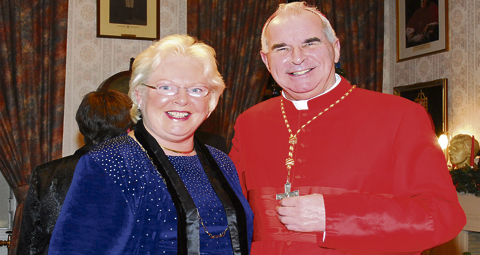BY Ian Dunn | January 27 2012 | ![]() 0 COMMENTS
0 COMMENTS ![]() print
print

Assisted suicide debate revived
Publication Date: 2012-01-27
Church condemns Margo MacDonald MSP’s latest attempt to bring issue before Scottish Parliament
The Catholic Church in Scotland has condemned Margo MacDonald’s latest attempt to legalise assisted suicide, just a year after her last effort was roundly defeated in the Scottish Parliament.
The Independent Lothians MSP unveiled a new consultation on the issue—which pushes for ‘a friend at the end’—at the Scottish Parliament on Tuesday despite the failure of her first bid to make it legal for the ill and the dying to seek help to kill themselves.
Prior to the defeat of Ms MacDonald’s last bill Cardinal Keith O’Brien, Britain’s most senior Catholic clergyman, warned that it would inevitably lead to repeated attempts to change the law.
Democratic process
Ms MacDonald’s new proposals come in spite of the comprehensive defeat of the previous End of Life Assistance (Scotland) Bill in a free vote at Holyrood just over a year ago. The Catholic Church was instrumental in the successful campaign against her legislation.
A spokesman for the Catholic Church in Scotland said it was ‘questionable’ that Ms MacDonald was returning this issue to the Scottish Parliament so soon.
“Nothing has changed,” Peter Kearney, director of the Scottish Catholic Media Office said. “Deliberate killing, even when assisting someone who is in a state of despair, is always wrong.
“Furthermore, it is questionable that a legislator would seek to continually return a proposed piece of legislation, even though it has recently been comprehensively defeated a number of times. Surely there is more to democracy than the idea that one introduces proposals until they attain the answer they were looking for.”
Donna Nicholson, director of pro-life group SPUC Scotland, said Ms MacDonald’s return to this issue was a ‘depressing and worrying’ development.
“Hardly a year has passed since the Scottish Parliament rejected the End of Life Assistance Bill by 85 votes to 16—in fact every single parliamentary term since the opening of the Scottish Parliament has seen an attempt to introduce euthanasia laws in some form,” she said. “Once again we would urge concerned members of the public to take part in the consultation process and to contact their constituency and regional MSPs to oppose this latest bill because no matter what form this consultation takes it does not negate the fact that the right to die will all too soon, despite the best safeguards, become the duty to die for the elderly, the infirm, the disabled or any such vulnerable groups in our society.”
John Deighan, parliamentary officer for the Scottish bishops and one of the leading campaigners against Ms McDonald’s assisted suicide campaign, said that bringing this issue back risked wasting the parliament’s time.
“The Scottish Parliament has already given considerable time to considering proposals from Margo MacDonald on euthanasia,” he said. “The committee which examined the previous proposal exposed the multitude of dangers and problems that any such legislation would create. There is absolutely no need to re-examine this issue so soon after it was overwhelmingly rejected when put to the vote in parliament. There are real priority issues which our politicians need to be giving their time to and they should not be distracted with this issue again.”
Flawed proposals
When Ms MacDonald’s first assisted suicide bill was rejected, Mr Deighan, said that it sent ‘a powerful message to the pro-life community around the world that euthanasia and assisted suicide laws can and must be rejected.’
In launching her new bill, Ms MacDonald, who has Parkinson’s disease, admitted her previous attempt at drawing up legislation on this issue had not been a success, even by her own standards.
“The previous bill was robust but cumbersome and if passed, I believe that very few if any people would have been able to negotiate all its hurdles in their quest for a peaceful death,” she said. “With the benefit of that experience the new proposal, whilst being equally robust aims to provide a clearer, more straightforward process.”
Among the new proposals she is putting forward is a suggestion that a trained ‘licensed facilitator’ would have to be present when someone is taking their own life. A facilitator could be a doctor, social worker, or close friend, but not a relative or anyone who stands to gain from the death.
Under the proposals the helper would be responsible for reporting the death to the police, but the suicide may have to be filmed to prove that it had been carried out by the patient themselves.
New MSPs
Ms MacDonald claimed that Scottish Parliament elections, resulting in a ‘new batch’ of MSPs sitting at Holyrood, meant she was justified in bringing this legislation forward again.
“Since the defeat of the first bill I presented to the third Scottish Parliament, a great deal has changed,” she said. “There is a new government and the composition of the various parties has changed.
“My supporters and I have learned lessons from the previous bill, not least from listening to the views and experiences of people on both sides of the issues. We remain convinced that majority opinion favours the position reflected by my bill—people in full command of their rights be able to request help to end their lives at a time and a place of their choice if their life has been made intolerable by an irrecoverable illness.”
Scottish law
It is not illegal to attempt suicide in Scotland but helping somebody take their own life could lead to prosecution for culpable homicide.
“Across the parliaments of the United Kingdom determined attempts are being made to legalise euthanasia,” Cardinal O’Brien previously warned. “We can be sure that further attempts to legalise euthanasia and physician-assisted suicide will be made in our parliaments. The threat of legally assisted suicide in Scotland is doubly concerning: not only would it endanger Scottish patients, but it would also lead to euthanasia tourism, as it is called, as already happens in Switzerland.”
The new consultation will accept submissions from members of the public until April 30.












